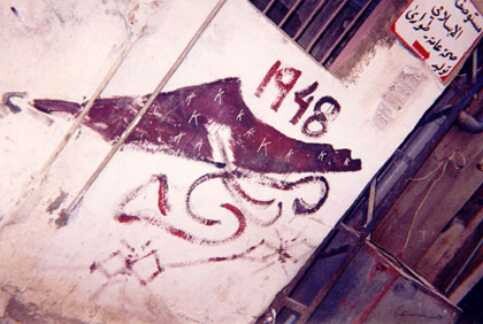
Writings on the walls of Shatila refugee camp (Photo: Children of Shatila)
So how do you feel about going back, now, after having been in Canada? He says to me: Words cannot describe it.
It’s like, well, here in Canada, you have life, you get up in the morning and you live. If you are bored, you walk out of your home and you find a park down the street to play in. In Lebanon, we don’t have this, we don’t have life. We can’t live in Lebanon.
I had the privilege of teaching Shaker two years ago in Bourj El-Barajneh Palestinian Refugee Camp in Lebanon. He has been visiting Canada now for the past three weeks, along with seven other Palestinian refugee youth. His English language skills are excellent, as he stands before audiences filled with hundreds of people, telling us about how he exists in Lebanon - deprived of civil liberties, victim of countless Human Rights abuses, caged within the open prison of a refugee camp. His voice is being heard.
Are we listening?
He tells me that dogs and cats for pets in Canada are entitled to more rights than Palestinians living in Lebanon on any given day, since their birth. He tells me that he is angry, yes, angry at a world that defines who is important and who is not. That he is living in a world that defines who is worthy of Life, in a world that defines him, purely by virtue of his birth, as a refugee - controlled in a space in a country that excludes him, tied up within an International System that would rather he fade away, than act to challenge the root aspects of what has created his refugee existence.
We marched in demonstration Saturday, protesting the deportation of Palestinian refugees from Canada, a situation that has become far to common in the aftermath of 9-11 nearly two years ago.
We marched in silence, hours along the streets of Montreal, and as we walked I thought to myself - How many demonstrations have I been to now, along this same route, this same path?
Are we listening?
Do we look at them without really seeing?
And in the end, as the crowd of demonstrators waits outside Immigration Canada, Shaker raises his voice. He grabs a microphone attached to two speakers strapped to the hood of a nice shiny new black Volkswagen Jetta that has been leading the silence of demonstrators, Palestine flag in one hand, microphone in another, he calls out - I don’t want to be called refugee. I want to be a human being like you! I want peace like you! I’m tired. I’m tired. I’m tired. I want my rights! I’m tired. Why am I not human to you? Tell me why? All I ask is why? Why? Explain to me why.
I think to myself as tears fall down my face - yes, let me explain to this fifteen-year-old adult that, well, you know, in this world, we tend to value some lives more than others. That’s the way it works. That is the world in which we live. Right. Look him in the eyes, big brown kind eyes, and tell him that it is okay for the world to ignore his existence. That he ought to accept that. This is normal in the Box of a World in which we live.
Perhaps we ought to step outside of the Box.
Perhaps we ought to listen to him.
Perhaps instead of evading the question, we ought to be able to look him in the eyes, and answer his question - Why?
Look into his eyes and tell him that he does not exist.
Nadia, another student I had the privilege of teaching in Bourj El-Barajneh camp, tells me that Insh’allah she will come to Canada to attend McGill University. Insh’allah - God Willing. I tell her to never give up hope. You have the right to this, you have the right to education. You have the right to fight-for-your-rights - never stop fighting, never stop Hoping, prove to the World that you exist. And she tells me, yes, what she needs most in the world is the right to be Human, that what she needs most is her fundamental Human Right to exist as I do - with a passport, a Place to live, a country.
Yes, Shaker and Nadia are not the only Human Beings struggling to be heard, this arguement I have heard before. Acknowledge this as true. They are not the only Human Beings struggling daily to maintain their Identity, their Place in the World, to engage in civil liberties, rights to live a Human Life. They are not the only Human Beings being murdered psychologically, emotionally, physically, every-single-day. Shaker and Nadia represent fifty-five years of their Palestinian history. Fifty-five years.
They are the longest standing refugee population in the history of the world. They were born into their stateless existence, handed a Palestinian Refugee Identity Card, controlled inside of a camp in Lebanon one square kilometer in size and 18 000 populated.
They are a certain life that I have fallen in love with. They are a certain youth that have taught me more than any University degree could cover. They are my tears rolling down my face - Hope, Pride, Struggle, Resistance, LIFE. Let them live.
We ought to listen to them.
We ought to be able to tell them, Why.
Shannon Dow volunteered with CEPAL in the Palestinian refugee camps of Bourj al Barajneh and Shatila in 2001, and is currently in Montreal.

